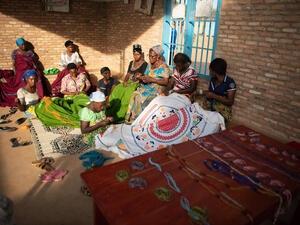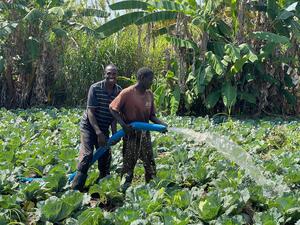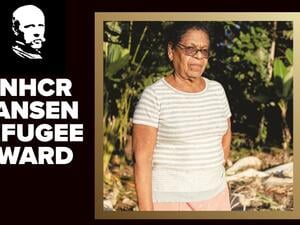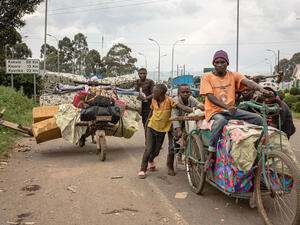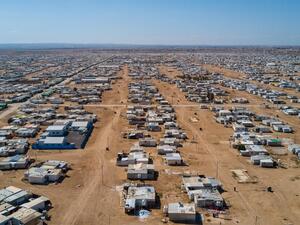Bangladesh: Myanmar refugees weave together self-reliance and hope
Bangladesh: Myanmar refugees weave together self-reliance and hope

In the remote Bangladeshi village of Faruk Para, 34-year-old Kil Cer, a Chin refugee from Myanmar, weaves a blanket under a self-reliance scheme funded by UNHCR.
FARUK PARA, Bangladesh, September 14 (UNHCR) - Kil Cer, a shy, petite 34-year Chin refugee from Myanmar, can be found every morning weaving blankets along with five other women in the village community centre in this remote lush green village in the Chittagong Hill Tracts.
But they're not just turning out the colourful traditional blankets their mothers and grandmothers have always made. In their own quiet way they've woven together a small-scale economic revolution in the settlement of 700, liberating their families from debt and dependence on handouts.
"I am happy now," says Kil Cer. "Before, it was a difficult struggle." Largely because of Kil Cer's weaving skills, her community has paid back all their debts. They are able to take care of their families without UNHCR's support and have invested money in other businesses, such as banana plantations, that also employ the local Bangladeshi host community, known as the Bawm.
"We speak almost the same language as they do and they have been very good to us," Kil Cer, a mother of two, says about her hosts.
Behind the success is a new UNHCR approach to developing self-reliance as part of UN High Commissioner for Refugees António Guterres's focus on refugees living outside camps. Learning from earlier projects that gave grants to refugees who did not have the proper skills or business education to use the money properly, UNHCR began relying on the expertise of local businesses to develop the skills of refugees in Bangladesh living outside camps.
Eight months ago, Kil Cer and other refugees in the village were heavily in debt after many of their projects - small rice mills, grocery shops and farming - failed. For many years, they had relied on UNHCR to pay their rent and give them money for basic commodities. Even when Kil Cer tried to support herself with weaving, she was only able to earn US$2 per blanket - hardly enough to cover her expenses.
"Like many girls in Myanmar, I was taught to weave by my mother in Myanmar when I was 15 years old," she says. In Bangladesh, she began weaving blankets and passed on the skill to a few other young women, both refugees and Bangladeshis.
The turning point came when UNHCR introduced her to Samantha Morshed, chief executive officer of Hathay Bunano, a company that was already employing rural Bangladeshi women and other disadvantaged people to make soft toys for the international market under fair trade rules. She provided free professional advice to Kil Cer and her team on improving their products and marketing them, to make best use of a UNHCR start-up loan of US$250.
Today their offerings include shawls, scarves, ponchos, baby blankets, picnic blankets, bedspreads and bags marketed under Expression in Exile, a brand that is becoming popular with the urban elite in the Bangladeshi capital, Dhaka. Within a month, they made a profit of US$800, a substantial amount for the residents of Farak Pura, and today demand is outstripping supply.
"I was excited when I first saw the blankets from Expression in Exile and am happy to give the group a little direction in terms of colours, sizes, pricing and raw materials," says Morshed. "I see no reason why these blankets cannot achieve mainstream export sales in the near future."
Now that her daily needs are taken care of, Kil Cer is already looking to a future she could scarcely have dreamed of a year ago. "I want to invest the money in my children's education," she says. Her 19-year-old colleague, Siang Khin Par, has similar high hopes: "I do this because I would like to be self-reliant. I would like to learn computing and English."
UNHCR Representative in Bangladesh Saber Azam says the programme is paying benefits not only for the refugees but for Bangladesh as well.
"Ensuring that refugees are able to take care of themselves and their communities is often a more humanitarian activity than giving them free hand-outs for years," he says. "Kil Cer has also demonstrated how refugees can help their Bangladeshi hosts rather than being a burden on them."
By Jelvas Musau in Faruk Para and Arjun Jain in Dhaka, Bangladesh


